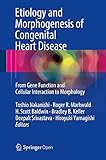Etiology and Morphogenesis of Congenital Heart Disease [electronic resource] : From Gene Function and Cellular Interaction to Morphology / edited by Toshio Nakanishi, Roger R. Markwald, H.Scott Baldwin, Bradley B. Keller, Deepack Srivastava, Hiroyuki Yamagishi.
Material type: TextPublisher: Tokyo : Springer Japan : Imprint: Springer, 2016Description: XII, 383 p. 109 illus., 99 illus. in color. online resourceContent type:
TextPublisher: Tokyo : Springer Japan : Imprint: Springer, 2016Description: XII, 383 p. 109 illus., 99 illus. in color. online resourceContent type: - text
- computer
- online resource
- 9784431546283
- 616.12 23
- RC681-688.2
Part I. From Molecular Mechanism to Intervention for Congenital Heart Diseases, Now and Future -- Reprogramming Approaches to Cardiovascular Disease: From Developmental Biology to Regenerative Medicine -- The arterial epicardium, a developmental approach to cardiac disease and repair -- Cell sheet tissue engineering for heart failure -- Future treatment of heart failure and pathophysiological analysis of various heart diseases using human iPS cell-derived cardiomyocytes -- Congenital heart disease: in search of remedial etiologies -- Part II. Left-Right Axis and Heterotaxy Syndrome -- Left-right Asymmetry and Human Heterotaxy Syndrome -- Roles of motile and immotile cilia in left-right symmetry breaking -- Role of cilia and left-right patterning in congenital heart disease -- Pulmonary arterial hypertension in patients with heterotaxy /polysplenia syndrome -- Part III. Cardiomyocyte and Myocardial Development -- Single Cell Expression Analyses of Embryonic Cardiac Progenitor Cells -- Meis1 Regulates Post-Natal Cardiomyocyte Cell Cycle Arrest -- Intercellular signalling in cardiac development and disease: NOTCH -- The epicardium in ventricular septation during evolution and development -- S1P-S1p2 signaling in cardiac precursor cells migration -- Myogenic progenitor cell differentiation is dependent on modulation of mitochondrial biogenesis through autophagy -- The role of the thyroid in the developing heart -- Part IV. Valve Development and Diseases -- Atrioventricular valve abnormalities: From molecular mechanisms underlying morphogenesis to clinical perspective -- Molecular Mechanisms of Heart Valve Development and Disease -- A novel role for endocardium in perinatal valve development: Lessons learned from tissue specific gene deletion of the Tie1 receptor tyrosine kinase -- The Role of the Epicardium in the Formation of the Cardiac Valves in the Mouse -- TMEM100, a novel intracellular transmembrane protein essential for vascular development and cardiac morphogenesis -- Cell autonomous regulation of BMP-2 in endocardial cushion cells during AV valvuloseptal morphogenesis -- Part V. The Second Heart Field and Outflow Tract -- Properties of cardiac progenitor cells in the second heart field -- Nodal signaling and congenital heart defects -- Utilizing Zebrafish to Understand Second Heart Field Development -- A history and interaction of outflow progenitor cells implicated in “Takao syndrome” -- The loss of Foxc2 expression in the outflow tract links the interrupted arch in the conditional Foxc2 knockout mouse -- Environmental modification for phenotype of truncus arteriosus in Tbx1 hypomorphic mice -- Part VI. Vascular Development and Diseases -- Extracellular matrix remodeling in vascular development and disease -- The “cardiac neural crest” concept revisited -- Roles of endothelial Hrt genes for vascular development -- Placental Expression of Type 1 and 3 Inositol Trisphosphate Receptors is Required for the Extra-embryonic Vascular Development -- Tissue Remodeling in Vascular Wall in Kawasaki Disease-related Vasculitis Model Mice -- Part VII. Ductus Arteriosus -- Progerin expression during normal closure of the human ductus arteriosus: A case of premature ageing? -- The multiple roles of prostaglandin E2 in the regulation of the ductus arteriosus -- Developmental Differences in the Maturation of Sarcoplasmic Reticulum and Contractile Proteins in Large Blood Vessels Influences Their Contractility -- Fetal and Neonatal Ductus Arteriosus is Regulated with ATP-sensitive Potassium Channel -- Part VIII. Conduction System and Arrhythmia -- Regulation of vertebrate conduction system development -- Cardiac Pacemaker Development from a Tertiary Heart Field -- Endothelin receptor type A expressing cell population in the inflow tract contributes to chamber formation -- Specific isolation of HCN4 positive cardiac pace-making cells derived from embryonic stem cell -- Part IX. Current Molecular Mechanism in Cardiovascular Development -- Combinatorial functions of transcription factors and epigenetic factors in heart development and disease -- Pcgf5 contributes to PRC1 (Polycomb repressive complex 1) in developing cardiac cells -- non-coding RNAs in cardiovascular disease -- Part X. iPS Cells and Regeneration in Congenital Heart Diseases -- Human pluripotent stem cells to model congenital heart disease -- Engineered cardiac tissues generated from immature cardiac and stem-cell derived cells: Multiple approaches and outcomes -- Dissecting the left heart hypoplasia by pluripotent stem cells -- Lentiviral gene transfer to iPS cells; toward the cardiomyocyte differentiation of Pompe disease-specific iPS cells -- Molecular analysis of long-term cultured cardiac stem cells for cardiac regeneration -- Epicardial contribution in neonatal heart regeneration -- Part XI. Current Genetics in Congenital Heart Diseases -- Genetic discovery for congenital heart defects -- Evidence that deletion of ETS-1, a gene in the Jacobsen syndrome (11q-) cardiac critical region, causes congenital heart defects through impaired cardiac neural crest cell function -- Notch signaling in aortic valve development and disease -- To detect and explore mechanism of CITED2 mutation and methylation in children with congenital heart disease.
Open Access
This volume focuses on the etiology and morphogenesis of congenital heart diseases. It reviews in detail the early development and differentiation of the heart, and later morphologic events of the cardiovascular system, covering a wide range of topics such as gene functions, growth factors, transcription factors and cellular interactions that are implicated in cardiac morphogenesis and congenital heart disease. This book also presents recent advances in stem cell and cell sheet tissue engineering technologies which have the potential to provide novel in vitro disease models and to generate regenerative paradigms for cardiac repair and regeneration. This is the ideal resource for physician scientists and investigators looking for updates on recent investigations on the origins of congenital heart disease and potential future therapies.
There are no comments on this title.
